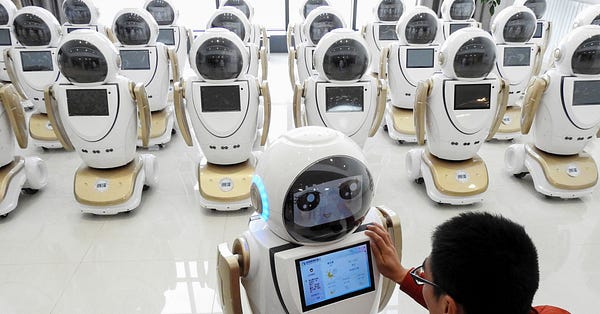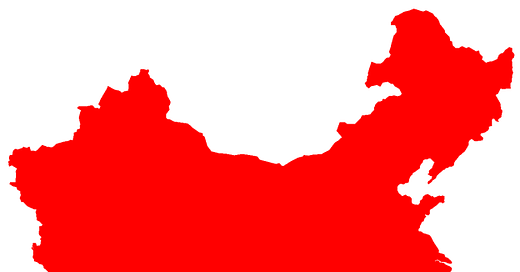In the last week, there has been an increase in the discussions about China’s economic plans and what they might mean. This week we are focusing on the importance of flexibility in state planning and the current emphasis on China’s economic concepts and the domestic and international political environment they are developing within. Thank you for subscribing, and if you enjoy reading this, please forward the newsletter to your friends. ~ Kevin
Quote:
“The great source of both the misery and disorders of human life, seems to arise from over-rating the difference between one permanent situation and another. Avarice over-rates the difference between poverty and riches: ambition, that between a private and a public station: vain-glory, that between obscurity and extensive reputation. The person under the influence of any of those extravagant passions, is not only miserable in his actual situation, but is often disposed to disturb the peace of society, in order to arrive at that which he so foolishly admires.” ~ Adam Smith, The Theory of Moral Sentiments
A phrase we heard during the US election in 1992 was “It’s the Economy … Stupid”. As we are aware, this catchphrase knows no geographic bounds. News out of China shows an increased emphasis on the economy and a state-led revival of economic development concepts. This is likely due to several factors, as we will examine. That shift in emphasis on the economy may also suggest some things about the national outlook in China.
Dual Circulation Theory is an idea being advanced by the leaders of the Chinese Communist Party that emphasizes two forms of growth. Economic growth occurs through the country’s domestic consumption market as well as through exports. No doubt many following China could rightfully point out that this concept is similar to the existing economic engines for China. For China, like most countries, this is a typical approach. It is not unlike a company saying it will turn a profit by providing products and services. Both types of claims are sufficiently broad to be useful to operate within. I think the purpose of this framework in discussing the economy is to create an environment where the broad concept can be employed to explain a whole range of scenarios.
Why is this descriptive approach employed? China needs both robust exports and domestic consumption. It is assumed that if exports were to decline due to trade competition and manufacturing shifting away from China, the country does not have an adequate domestic market, at least in the short term, to create sufficient demand to meet its supported production.
Therefore, I read this language as a sign that China may be preparing for a transition. As always conditions remain influx. Who would have thought 12 months ago that the US and China would have reached a point where their strained relations could affect trade? The enmity on both sides is shared by politicians and the public, and this can be expected to be a serious conditioning force for some years. In response to the epidemic, China shut down numerous cities and production for months, and initially offered targeted relief to specific population hubs. It has recovered somewhat, but China is still projected to have its lowest annual GDP in decades.

This dual approach gives China flexibility to modify and promote efficiency or to start emphasizing either domestic consumption or exports. Bill Bishop anticipates this concept will be featured prominently in the roll-out of the Chinese Communist Party’s 14th Five Year Plan. Just as in the USSR these Five-Year Plans outline a prearranged national focus on production, technology, and development. Under the Plan, the proponents aspire to maintain the advancement of a system of socialism with Chinese characteristics. We may see an increased emphasis on domestic consumption that will occur, either from Say’s Law (“the mere circumstance of creation of one product immediately opens a vent for other products”) or the Chinese Communist Party will say to consume certain goods.
The two terms “socialism” and “Chinese characteristics” allow for flexibility in implementation, where China emphasizes each concept as needed. So, too, will the Dual Circulation Theory. Others seem to disagree with this argument of flexibility and suggest this is more about China emphasizing domestic consumption. I think this is a possibility but also under this approach, it would allow for trying to emphasize domestic consumption. In the event it fails, then the approach can be modified.
A helpful indicator on this front will be how China frames this approach relative to its Belt and Road Initiative, and what commitments are made under each. From an international perspective that maybe China responding to the regional investment challenges it was facing, even before the outbreak of Covid-19. Whether it be the dual circulation approach, Trump’s tactical use of tariffs on steel and aluminum, or the UK restricting technology, we see some economic self-sufficiency winds blowing. It is unclear how strong the winds are and, as I have argued before, the present is not always a very helpful leading indicator of the future.


**Regular China news and analysis, I subscribe to Bishop’s Sinocism on Substack**
Speaking of the weather, while folks obsess over trivial debates, China has been hit by an extraordinarily severe rainy season. Huge rains have severely taxed China’s elaborate dam system on the Yangtze river basin, and are responsible for the deaths of hundreds and evacuations in the hundreds of thousands. Chinese authorities have had to continue to reassure the public the largest dam on earth, the Three Gorges Dam, will be able to handle this uncharacteristically heavy rain season.
I am enjoying the chance to share these newsletters with you in the form of the new podcasts and appreciate your continued feedback. You can reply to this email or leave your comments below. I sincerely enjoy chatting and learning what folks think. Thank you ~ Kevin













Share this post